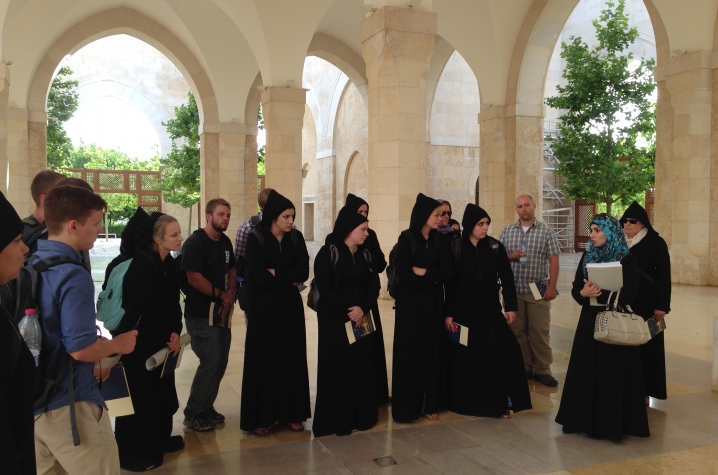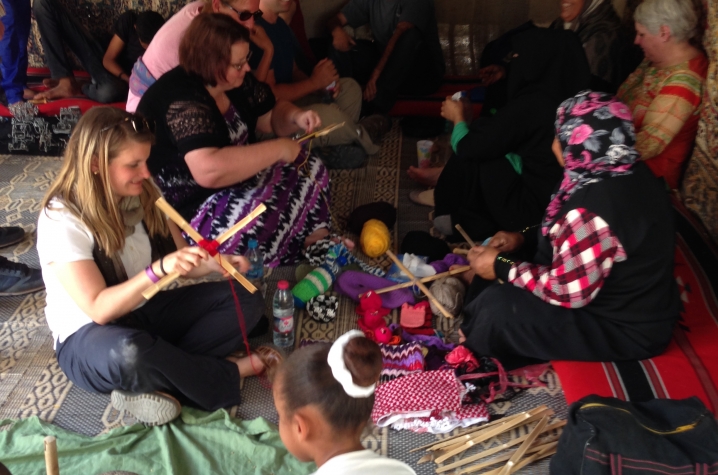Passport to the World Takes UK Faculty to Middle East
LEXINGTON, Ky. (July 6, 2015) — In support of the College of Arts and Sciences’ Passport to the World Initiative and the 2015 Year of the Middle East campaign, University of Kentucky Education Abroad partnered with the college to sponsor a faculty development seminar in the Middle East focusing on contemporary issues pertinent to the region.
The seminar was developed to provide faculty members with an opportunity to gain firsthand experience with the issues concerning the region and thus, to better equip them to share their knowledge and experience with their students and subsequent international initiatives, such as developing institutional partnerships and further education abroad programming at UK.
The following faculty members were selected to attend the seminar:
Paul Chamberlin, College of Arts and Sciences, Department of History
Nancy Johnson, Gatton College of Business and Economics
Jim Ridolfo, College of Arts and Sciences, Department of Writing, Rhetoric, and Digital Studies
Lynn Roche Phillips, College of Arts and Sciences, Department of Geography
Janet Stamatel, College of Arts and Sciences, Department of Sociology
Monica Visonà Blackmun, College of Fine Arts
Raegan Wilson, College of Arts and Sciences
Facilitated by Anthony Ogden, the executive director of UK Education Abroad and Exchanges, the seminar hosted educational lectures and cultural site visits to both Jordan and Morocco. Participants were able to study the effects of transculturation issues in Morocco.
The first week of the seminar took participants to Amman, Jordan. The capital city enjoys a thriving arts scene featuring film and music festivals and is a hub for culture, education and business. UK Faculty members studied women’s legal challenges and rights through interaction with women in leadership positions and personal narratives with women in the community.
“The faculty seminar on Women in Islam in Jordan allowed us to interact with women in a variety of settings, like professionals in Amman, mothers in the countryside, widows in a small town,” Stamatel said. “This is important to move beyond stereotypes of women living in Muslim countries and understand how religion interacts with people’s everyday lives.”
A visit to the University of Jordan Center for Women Studies allowed participants a space to discuss academic and theoretical frameworks related to Middle Eastern women.
These discussions carried over to a visit to Wadi Mousa Village, a small town south of Amman, where faculty were able to see examples of women as household income-generators and better understand the challenges and achievements of women in small villages.
“I enjoyed visiting with the indigenous people of Jordan and Morocco — natives whose voices are being hushed by political powers,” said Dr. Lynn Phillips. “Hearing about their plight to retain their own traditions in an increasingly globalized world was enlightening.”
The seminar’s second week transitioned to Morocco and focused on three pillars: Encounters, Conflicts and Transculturation. Objectives for this week sought to engage participants in discussions on community-based conflict resolution efforts as well as viewing the effects of Westernization and ‘Easternization’ on Moroccan transculturation. A visit to the Association Marocain des Droits Humains in Rabat gave the faculty a greater understanding of present human rights issues in contemporary Morocco and how they have been shaped by political and historical events.
"In Morocco we had the opportunity to see how a country responds to a diverse linguistic and cultural fabric,” Ridolfo said. “This inspiring experience will help me to convince WRD students to study abroad."
The group also spent one night in Casablanca in order to study the city’s role in cultural merging in Moroccan history, particularly in the resolution of conflicts. Other sessions included a visit to Meknès to study the aspects of Sultan Moulay Ismail’s rule and its contribution to the city’s resulting transculturation.
Following the seminar, the group compiled their key findings and developed immediate action items for effectively disseminating their experiences throughout the UK community.
“It was a terrific opportunity to work with these faculty and to explore important and relevant topics that are of importance to understanding the broader Middle East region,” Ogden said.
For more information on future faculty opportunities with Education Abroad, visit the EA website.
MEDIA CONTACT: Blair Hoover, 859-323-2395; blair.hoover@uky.edu






